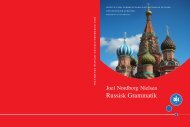[hprints-00683151, v2] Enea Silvio Piccolomini (Pius II ... - Hprints.org
[hprints-00683151, v2] Enea Silvio Piccolomini (Pius II ... - Hprints.org
[hprints-00683151, v2] Enea Silvio Piccolomini (Pius II ... - Hprints.org
Create successful ePaper yourself
Turn your PDF publications into a flip-book with our unique Google optimized e-Paper software.
<strong>hprints</strong>-<strong>00683151</strong>, version 2 - 19 Mar 2013<br />
1.1.1. The attitude of the Turks<br />
[20] They are in fact acting with good reason since they know that the duke<br />
descends from the Turks 265 of old 266 . Thus, he is related to them by a hereditary<br />
bond which cannot in good faith be disclaimed. The Byzantine 267 emperor 268 fears<br />
that the Turks will lay siege to Constantinople in his absence 269 , but because of that<br />
relationship he thinks that the duke may obviate the risk by writing a letter to the<br />
prince of the Turks that the Greeks would be coming to Italy purely for the sake of<br />
the faith. As long as his own power is not concerned, the Turk is indifferent to the<br />
matter of the Christian faith, and he would believe the duke writing to him to this<br />
effect. Others the Turk would not believe as he would consider their words as<br />
coming from enemies and believe that he was being deceived. It must also be kept<br />
in mind that almost all Greeks are subject to the power of the Turks, and we<br />
therefore have to take pains to avoid that their overlords begin to suspect a revolt<br />
and hinder their departure. For indeed, no one can bring over the Greeks if the<br />
Turks are unwilling.<br />
265 Interestingly, in this very early text <strong>Piccolomini</strong> follows the thesis that the Turks originate from the Trojans, a thesis<br />
that he later vehemently – and correctly – opposes, cf. <strong>Pius</strong> <strong>II</strong>: Orationes, I, p. 269, and Helmrath, p. 106-107. He does<br />
not, however, use the term “teucri”, a classical term for the people living around Troy, used also by Virgil in that<br />
famous passage: Equo ne credite, Teucri. Quidquid id est, timeo Danaos et dona ferentes (Men of Troy, trust not the<br />
horse. Whatever it be, I fear the the Greeks, even when bringing gifts). Virgil, Aeneid, 2, 48-49.<br />
266 In the style of the times, a classical genealogy had been constructed for the house of the Viscontis, making them<br />
the descendants of the Trojans. <strong>Piccolomini</strong> probably knew about this genealogy from Andrea Biglia, cf. above section<br />
4.4.1. If both the present-day Turks and the Viscontis descended from the Trojans (Turks of old), they are related<br />
through their common forefathers, and <strong>Piccolomini</strong> therefore claims that this family bond will make the Turks trust<br />
the Visconti Duke. The claim is, of course, completely preposterous, and it is doubtful that any educated person in the<br />
assembly would have believed it all. Cf. <strong>Pius</strong> <strong>II</strong>: Orationes, p. 36, n.8<br />
267 “romeorum”<br />
268 Johannes V<strong>II</strong>I Palaiologos (b. 1392, e. 1425, d. 1448): Second last Greek Roman emperor<br />
269 As well he might in view of the expansionist policies of the Turks and their former attacks on Constantinople<br />
67


![[hprints-00683151, v2] Enea Silvio Piccolomini (Pius II ... - Hprints.org](https://img.yumpu.com/16048892/67/500x640/hprints-00683151-v2-enea-silvio-piccolomini-pius-ii-hprintsorg.jpg)
![[hprints-00284881, v1] Musik i gymnasiet](https://img.yumpu.com/17715560/1/190x245/hprints-00284881-v1-musik-i-gymnasiet.jpg?quality=85)

